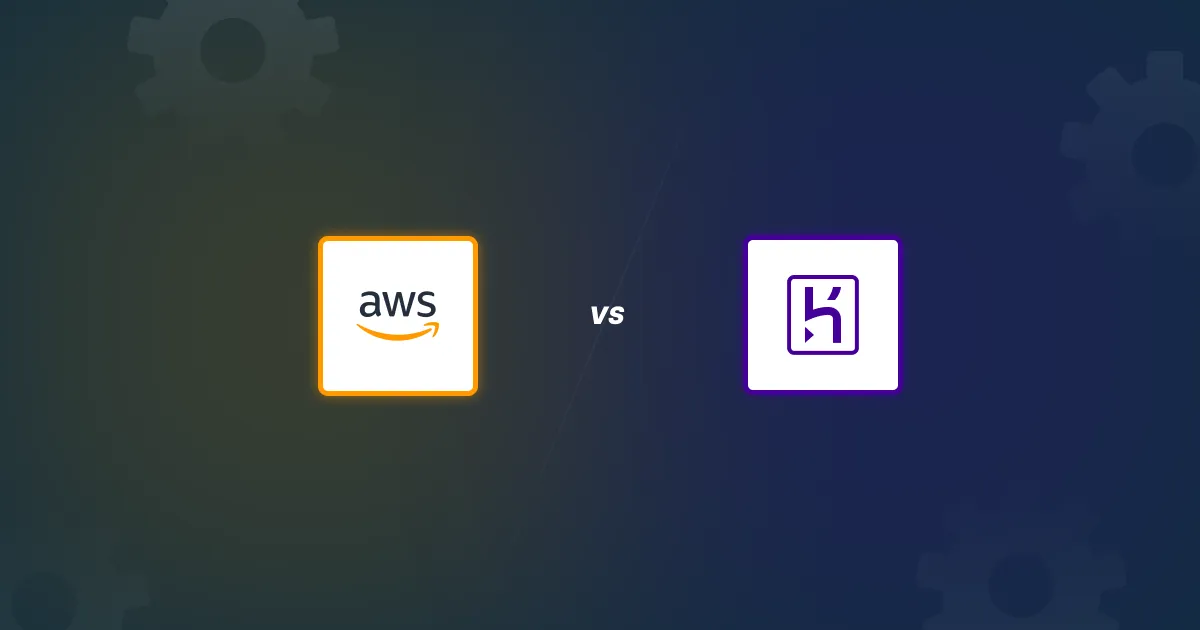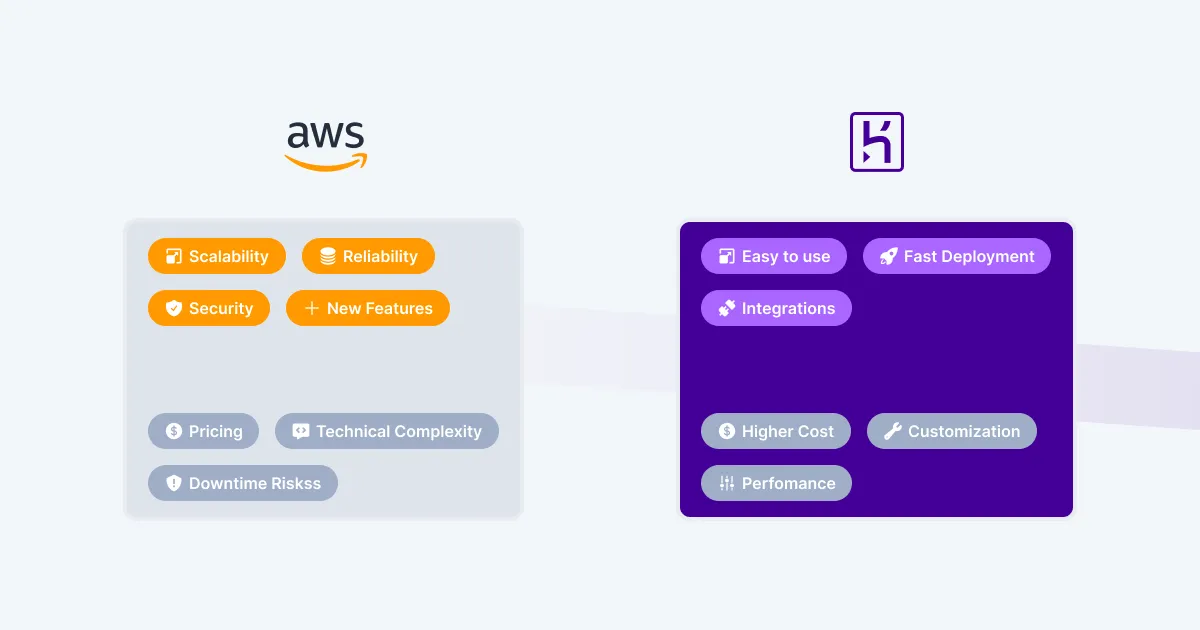Heroku vs AWS: Which Platform Is Better?

Heroku and AWS are both great cloud service providers, but some differences and benefits make one provider better than the other. While some developers choose Heroku for rapid application deployment, others prefer AWS because it is an excellent option for applications that need intensive performance and great scalability.
As both platforms evolved with different updates and offerings, it became more challenging to choose one. However, in this blog, we will explore Heroku vs AWS, how they work, and which one to choose.
How Does AWS Work?
Amazon Web Services, or AWS, provides more than 240 services, including Infrastructure as a Service (IaaS), Platform as a Service (PaaS), and Software as a Service (SaaS) options. Configuring and managing a server to meet the needs of your particular application typically requires a significant amount of work.
As an IaaS, AWS is well-known for offering a great level of control over infrastructure. Some of the most used services are Amazon Simple Storage (S3) and Elastic Compute Cloud (EC2). AWS services are accessible through a web interface, command-line tools, or APIs, making it flexible and efficient for building and running applications of all sizes.
Advantages of AWS
Amazon Web Services (AWS) is a leading cloud platform known for its extensive service offerings and global infrastructure. It enables businesses to develop, deploy, and scale applications efficiently. With its powerful infrastructure and high level of flexibility, AWS is especially suited for complex projects that require detailed configuration, scalability, and ongoing management.
Below are some of the key advantages that make AWS a leading choice for cloud solutions:
- Scalability: AWS allows businesses to scale resources up or down faster, based on demand, ensuring cost efficiency and performance.
- Flexibility: AWS supports a wide range of operating systems, programming languages, and application platforms, giving users the freedom to build their applications as needed.
- Reliability: It provides a highly reliable infrastructure with multiple data centers to ensure uptime and disaster recovery.
- Security: AWS offers robust security features, including data encryption, identity and access management, compliance certifications, and monitoring tools.
- New Features: AWS constantly adds new services and features, helping users stay ahead with modern technologies.
AWS offers a powerful combination of benefits, making it an ideal cloud solution for businesses of all sizes looking to grow.
Disadvantages of AWS
Some of the limitations that businesses may face with AWS are:
- Pricing: AWS has a wide variety of services and pricing models, which can make it difficult for users to estimate.
- Downtime Risks: Although AWS is highly reliable, it is vulnerable to service interruptions, which can impact business operations.
- Technical Complexity: While AWS offers powerful tools, setting up and managing services can be challenging without prior cloud experience or technical expertise.
AWS offers powerful cloud solutions, but also comes with challenges that every business should be prepared to properly manage. However, AWS offers a wide range of automated services, including scalability and configuration, robust security, and reliability, making it the ideal solution whether you're a startup or a large company.

How Does Heroku Work?
Heroku is a Platform as a Service (PaaS) built on Amazon Web Services (AWS) infrastructure. It is very effective and supports rapid scalability, deployment, and building. Its services are far easier to use. Because the infrastructure part is completely controlled, Heroku has become famous for accelerating development cycles.
Advantages of Heroku
Here, we'll look at the advantages that Heroku offers:
- Easy to Use: Heroku offers a developer-friendly platform with a simple deployment process, ideal for beginners and advanced development teams.
- Fast Deployment: Applications can be deployed and updated quickly without complex server configuration.
- Integrations: Databases, monitoring, logging, and other add-ons are all easily integrated into your app with Heroku's infrastructure.
As a platform, Heroku offers many benefits for all development teams.
Disadvantages of Heroku
There are also certain disadvantages that a team may face while working with the Heroku platform, such as:
- Higher Cost: While Heroku is cost-effective for small apps, pricing can become expensive as your application grows.
- Limited Customization: It limits your ability to customize your server-level settings compared to platforms like AWS.
- Limitations on Performance: For high-performance applications, Heroku may not offer the same power or consistency as other dedicated server environments.
- Limited Geographic Control: Unlike AWS or Google Cloud, Heroku provides less control over data center regions.
- More Dynos: As your app increases, more Dynos are required, leading to more expenses.
Although Heroku is an easy-to-use platform for app deployment, its limitations in cost scalability, performance, and customization can limit its usage for larger or more complex projects in the future. Also, you can explore Heroku alternatives that provide more control, better scalability, and better cost management.
Heroku vs AWS: Which One to Choose
When thinking about Heroku vs AWS, decide by the scale and long-term goals of your project. Heroku is known for its user-friendly interface and rapid deployment process, making it a great fit for individual developers, small teams, and startups that want to launch quickly without managing the fundamental infrastructure.
On the other hand, AWS is a more comprehensive and adaptable cloud platform suited for businesses that require advanced capabilities, more control, and the ability to handle complex workloads. With its wide selection of services, strong performance, and robust security features, AWS is ideal for organizations planning to grow and maintain large-scale and vital applications.
Final Thoughts
Analyzing the key differences in Heroku vs AWS, these two solid cloud platforms helps in determining your choice for your future projects. The level of flexibility that development teams need significantly impacts their decision between choosing the right one. Therefore, in order to choose the ideal cloud service, you will need to measure the needs of your development teams and analyze your business goals.
Subscribe to receive the latest blog posts to your inbox every week.
*By subscribing you agree to with our Privacy Policy.

Relevant Posts



